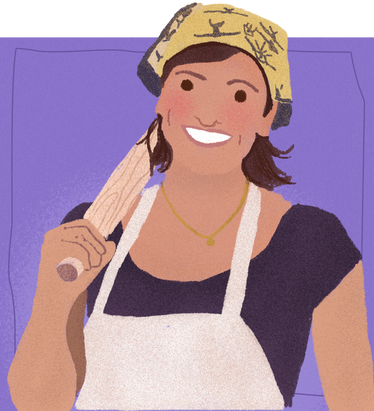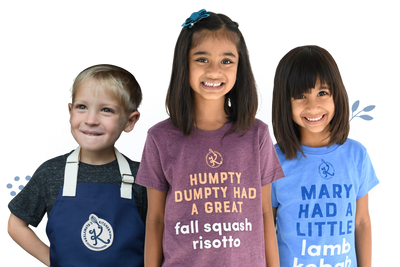
Taste Bud Profile
Bri Warner

I have to imagine it's impossible to hear Bri Warner's story and not be completely blown away. Truly. From brokering conversation and peace through a pancake dinner in Guinea, to creating meaningful occupational opportunities for newly resettled Americans in Portland, to founding a seaweed farming company, Bri has found a way to use food to teach, to create a positive impact, and to nourish and encourage connections in so many ways.



Bri Warner: My love of food culture has quite simply come from my love of eating food.
I’m from a small town in PA. My mother, Linda, was born and raised in that town and never really had the opportunity to travel extensively. But she would regularly make dinners themed from places she had never been—Moroccan night, Japanese night—her best approximations based on what she could get in the store. She passed away when I was young, but that spirit of travel really gave me an appreciation for knowing what else was out there. And I was amazed that there was a bigger world out there.
I knew from when I was 5 years old that I wanted to be a diplomat. My plan never deviated. I wanted to go overseas because I never understood why people would choose to fight instead of finding common ground.
I believed that there were more similarities to be found between people than differences, and that if we could just talk about it, we could avoid fighting. In my family, we talked over food. Big meals brought everyone together. I spent time in Egypt and found that it was the same deal there—people communicated over food. When I was there, there were heightened tensions between Christians and Muslims, but they all cooked the same food, went to the same restaurants, and took pride in who could make the best kosheri. It didn’t matter who they were. The passion was the same.

My first diplomatic tour was in Guinea, when there was significant civil strife at the time. I knew that the only way to change minds was through the country’s youth—so I invited prominent youth leaders (who were at the center of the ethnic strife) over to my house. I wanted to disarm everyone with food so we could really start to have a conversation—so I made pancakes (of course). I invited everyone over, and asked them to check their weapons at the door. My father-in-law shipped me maple syrup from Maine. Sitting at the same table, all of these youth leaders were heard on equal footing. They united around food they had never had, all collectively wondering “what is this crazy diplomat doing?” They started coming over every few weeks, bonding over “bread and sugar water” and they talked about what they had in common—they all wanted a better future for their families and for themselves. They ended up forming a youth group together. They started a non-profit. When the first democratic elections happened, there was minimal civil strife in the streets. These same youth leaders were some of those encouraging dialogue in the streets instead of violence.
I’m not saying that pancakes caused all of that, but the small act of communing over food certainly opened the door to a much wider world of empathy and dialogue.
I later worked in Europe, and travelled as much as possible to places that we might not necessarily have gone from the US—Romania, Lithuania, etc. I learned so much about all of these cultures of food, which are all so wildly different—but what is the same is that everybody takes pride in their food cultures, or the food the culture creates, depending on how you look at it. It was the same in Egypt, it was the same in Jordan, it was the same in Belgium. When I came back to the US, I didn’t know what I was going to do. Though Maine is a bit of a monolith in terms of demographics, the Portland area has a richness of newly resettled Americans—which is a fairly new phenomenon in the state. To me that is an untapped resource for culture and life and ultimately economics. But people struggled with how to employ newly settled refugees. There was some fear and mistrust, but mostly just a lack of communication.
But if you put two people in the kitchen who know how to cook, they’re going to cook something delicious whether they speak the same language or not. And they are going to get over whatever differences they had in the first place.

So I started a pie shop, focused on hiring newly resettled Maine residents. We made pies with fillings that represented flavors and traditions from all over the world, baked into something that is widely considered very American (though it isn’t)—a pie. Each employee brought a recipe or idea for a pie based on their home country or their life experience. We had a short rib and kimchi pie, a tagine pie—the tagline for the shop was “Pies like your mother never made”. The people who worked there weren’t pastry chefs, but just having a first job on their resumes coupled with the language skills picked up on the job made finding their next jobs that much easier, and the community that much more likely to embrace them. To that end, it wasn’t them assimilating, it was about the community opening their minds to what our community could be.
You can’t untangle food from economic security or economic future. I am now living in Maine and am growing a seaweed company—which may seem like a far reach from what I did in the past—but it isn't. On the seacoast, the lobster industry is one of the most well regulated, super protected industries in the country. It is globally a nearly 2 billion dollar industry. But it is currently experiencing the radical effects of global climate change, and the very species the industry depends on is threatened by rising water temperatures. The ocean is the economy on our coast. So how can we diversify what we do on the water? How do we utilize what is native to us and turn it into a profitable industry for those already working on the water? By building a company that focuses on helping fishermen adapt to and mitigate some of the effects of climate change through growing kelp, I am once again able to use food as a way to spur positive change in other aspects of our daily lives. 98% of the seaweed consumed in this country is imported, but we have some of the best water in the world for growing it. It’s not like we can’t find a way to use fresh kelp the way other countries do, we just never have. Seaweed farming is a way to diversify coastal incomes affected by climate change.
In order to make a big change on the water, we first have to change the way that Americans think about seaweed. So we made products that are easy to use—smoothie cubes, jarred seaweed salads, etc. My kids are so used to seaweed now I have to tell them not to eat it off the beach! Fresh kelp tastes almost more like a green bean, unlike the dried stuff. It’s such a logical and delicious addition to food we already eat. And people are starting to help us “sea change”—like David Chang and Sweetgreen, who really championed what we are doing in a collaboration earlier this year. David Chang knows more than anybody how to take food that people here might immediately react to as “different” or “weird” and make everybody dig it. They put about a quarter cup of kelp in that bowl and told everyone how delicious it was. That’s what it takes sometimes—just getting it in front of people and letting them try it themselves. It’s a real opportunity to create a market and transform an industry all through the production of food.
Food nourishes the soul and awakens memories and dreams. There are few experiences in the world that we all share—but food, and the way it makes us feel, is one of them.
In a world that feels divided, we can find connection over the figurative breaking of bread and there aren't walls around the dinner table. That's where we can find common ground.

